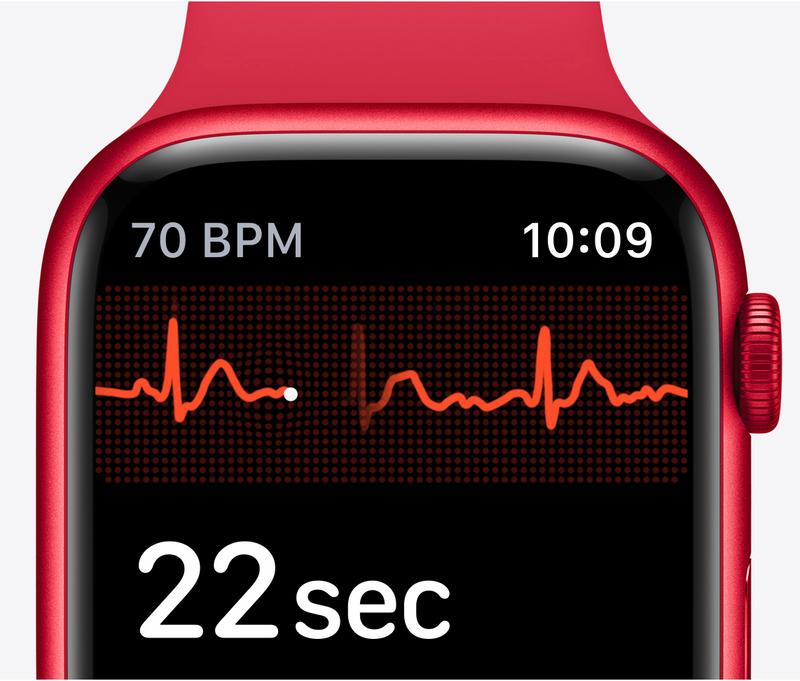
2 minute read
DOES IT REALLY HELP US STAY FIT?
By Ifeoma Osakwe
My relationship with my Apple Watch is borderline worrisome. Once, with barely five minutes to make the tenminute walk to my cycling group exercise class, I walked the whole way back to my dorm just because I forgot to wear the watch. In today’s technology-saturated world, however, I can take comfort in knowing that other gym-goers share this reliance on wearable fitness technology. After all, as clinical research specialist Brittney McCrary asserted, “Apple Watch or it doesn’t count” (Brown). Such perceptions of exercise arise from the growing prevalence of wearable fitness and healthcare devices and raise concern about how beneficial these devices truly are.
Advertisement
[RenderofAppleWatchHealthElectrocardiogram].(n.d.).

https://www.apple.com/apple-watch-series-8/
When motivating lifestyle interventions like increasing daily physical activity or water intake, however, wearables can be useful. In a 2021 study on members of a college community, Browne et al. showed that incorporating personalized feedback and encouragement in wearable fitness trackers caused improvements in participants’ sleep quality and physical activity (12). The same study suggests that when such tailored features are present, wearables help users form persistent healthy habits (11). These findings seem reasonable, as some Apple Watch users—including myself— often eagerly anticipate the digital award and accompanying celebratory message that the device presents when its user achieves a new personal best or completes a fitness goal. In this sense, fitness devices are valuable, especially for people who adopt the technology with the goal of bettering their lifestyles due to health concerns.
Yet, the question remains: are wearable fitness devices beneficial to regular gym-goers or the otherwise active population? Limited as it is, the existing research on this topic is conflicting. One research study on student athletes suggests that forming lasting habits may render wearable fitness trackers unimportant for maintaining health and fitness, thereby replacing them altogether (Bardus 13). In contrast, another study on older adults shows that even after forming good exercise habits, long-term wearable users did not abandon their devices (Kononova 9). Further study is necessary to draw a definite conclusion about the effectiveness of wearables for the active group but we can be certain that the “Apple Watch or it doesn’t count” mentality is flawed. The reality is that challenging oneself to reach fitness goals is fantastic and remains so even when one deserts their wearable device.
As technology penetrates the health and fitness industry, people must responsibly navigate the multitude of healthmarketed devices as they make consumer decisions. Some fully appreciate these devices and refuse to part with them, regardless of scientific findings that they are not as reliable as their manufacturers will admit. Still, with plenty of room to improve at measuring fitness indicators, wearables have some merit as they can help users create and maintain healthy habits through personalized feedback. Scholars must continue to investigate these devices to fully understand their effectiveness, especially since these devices will not leave the fitness industry soon.
[RenderofAppleWatchHealthTemperature].(n.d.). https://www.apple.com/apple-watch-series-8/

Works Cited
Bardus, Marco et al. "Exploring the Use of Mobile and Wearable Technology among University Student Athletes in Lebanon: Brown, Dalvin. “'Apple Watch or It Doesn't Count': How Tech Addiction Might Be Ruining Your Workout.” USA Today,
A Cross-Sectional Study." Sensors, vol. 21, no. 13, 2021, p. 4472, doi:10.3390/s21134472.
Gannett Satellite Information Network, 16 May 2019, https://www.usatoday.com/story/tech/2019/05/15/fitbitsapple-watches-and-smartphones-can-actually-hurt-your-workout/1186522001/.
Browne, Jonathan D. et al. "Lifestyle Modification Using a Wearable Biometric Ring and Guided Feedback Improve Sleep and Exercise Behaviors: A 12-Month Randomized, Placebo-Controlled Study." Frontiers in Physiology, vol. 12, 2021, doi:10.3389/fphys.2021.777874.
Kononova, Anastasia et al. "The Use of Wearable Activity Trackers among Older Adults: Focus Group Study of Tracker
Perceptions, Motivators, and Barriers in the Maintenance Stage of Behavior Change." JMIR Mhealth Uhealth, vol. 7, no. 4, 2019, p. e9832, doi:10.2196/mhealth.9832.
Shei, Ren-Jay et al. "Wearable Activity Trackers–Advanced Technology or Advanced Marketing?" European Journal of
Applied Physiology, vol. 122, no. 9, 2022, pp. 1975-90, doi:10.1007/s00421-022-04951-1.










